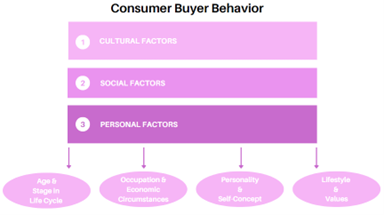Marketers use the principles of Consumer Buyer Behavior to understand their target audiences by identifying consumer’s needs and crafting effective marketing strategies that best influence their buying behavior.

The relevance of this method hit close to home while helping my a friend evaluate his options amongst graduate schools. As a professional, he had already worked in his industry for over 20 years. We both found it disappointing that some institutions’ messaging to prospective graduate students appeared largely targeted to younger individuals. A young professional approaches their graduate school decision-making through a very different set of factors than someone mid-career or later. Using my friend’s situation as an example, I encourage colleges and universities to review and improve their graduate student marketing efforts by utilizing the Consumer Buyer Behavior framework, paying particular attention to how Personal Factors impact decisions.
AGE & STAGE IN LIFE CYCLE: An individual’s preferences and tastes change in different stages of their life. Marketers must recognize these life stages and acknowledge that significant milestones such as graduation, marriage, having kids, divorce, caring for aging parents, etc., changes the lens from which a consumer would consider their product.
OCCUPATION & ECONOMIC STATUS: A consumer makes a decision knowing their own economic status and income (the level of which is often tied to their occupation) along with having awareness of external factors such as interest rates, inflation, and global economic impacts.
PERSONALITY & SELF-CONCEPT: A buyer’s view of themselves influences what they purchase. This self-awareness includes knowing what makes oneself unique, their own personal psychology, and what traits and characteristics they possess.
LIFESTYLE & VALUES: One’s interests, activities, and world views combine to form a foundation for how an individual lives their life. By understanding these factors, Marketers must align their marketing strategies to target their intended audience of decision-makers.
While understanding that colleges and universities must market themselves to a wide variety of audiences and consumers, the importance of crafting strategic marketing messages specific to their target buyers of mid-to-late career potential graduate students conveys that their school is the best choice to fulfill this audience’s needs and wants.
